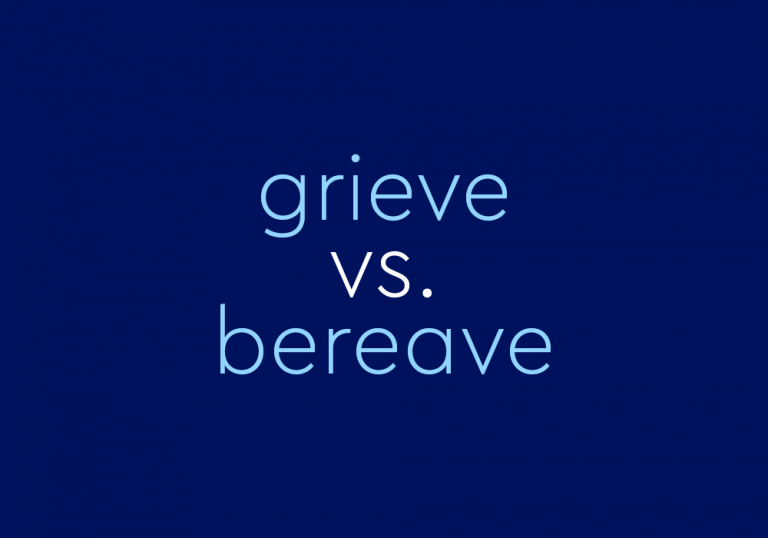“Grieve” vs. “Bereave”: What Is The Difference?

When you’re sad about the loss of a person, a pet, or even an item, it can feel like there are no words to describe those feelings. Emotions take over and melancholy sets in. But after that initial reaction, when the feelings start to subside, do you tell others you were grieving or bereaving that loss?
Let’s explore the differences between these two mournful words.
What does grieve mean?
To grieve is “to feel or express intense grief—mental or emotional suffering or distress caused by loss or regret.” Grieve often means the same thing as mourn. It’s especially used in the context of someone who is mourning the death of a loved one.
However, the word can also be used for other situations involving loss or regret, such as the end of a relationship or the loss of a job.
Less commonly, grieve can mean “to cause someone to feel grief,” as in It grieves me to see you so sad.
The word grieve came about around the year 1200. It comes from the Latin verb gravāre, meaning “to burden,” from gravis, “heavy.” The same root forms the basis of the words gravity and the adjective grave meaning “serious.”
People who are grieving—and those who try to help them deal with their grief—often become familiar with the popular theory that there are five stages of grief, which was developed by psychiatrist Elisabeth Kübler-Ross. According to Kübler-Ross, the five stages of grief are:
- Denial: difficulty believing that what has happened is real;
- Anger: frustration that it has happened to you;
- Bargaining: such as thinking about “what ifs” and trying to find a way out of what has happened;
- Depression: the sorrow that comes with the realization that what has happened is real and nothing can be done to change it; and
- Acceptance: accepting what has happened and attempting to move on.
Find out more about the meaning and uses of the word grieve at our article on the word here!
What does bereave mean?
To bereave means “to take away and leave devastated.” Death bereaves us of our loved ones.
Bereave can also mean “to deprive by force,” as in War has bereaved them of their homes.
Those who are devastated by the loss of loved ones can be described as bereaved or bereft. These words can also apply to those who have suffered other serious losses.
Bereave is most often used in the context of death. The noun form of bereave is bereavement, referring to “a period of mourning or or state of intense grief, especially following the death of a loved one.” Bereavement can also be used more generally to mean the state of having lost something very dear. A person going through bereavement is often referred to as the bereaved.
The first records of the word bereave come from before the year 900. Bereave is related to the word reave, which means “to rob.”
Lift your lexical spirits by learning more about the meaning and uses of the word bereave at our article on the word here!
One last time …
Those who are grieving are those who have been bereaved. Those who are bereaved are often grieving (not bereaving).
So, grieve generally describes the feelings after a lost, and bereave describes the actual loss.
Let’s try it out:
- Cancer has ______ me of two family members.
Which word fits into the sentence above?
If you answered bereave (i.e., bereaved), you’re correct. Cancer has taken away the two loved ones.
Here’s another:
- To all the families who are ______ the loss of a loved one, I offer you my sincere condolences.
Which word fits into this sentence above?
If you answered grieve (i.e., grieving), you are correct again! The families are grieving the loss of the loved ones, it is how they feel.
Don’t mourn the loss of your youth, but celebrate the many years you’ve experienced so far! Read about the distinctive terms we have for people of different decades of age!